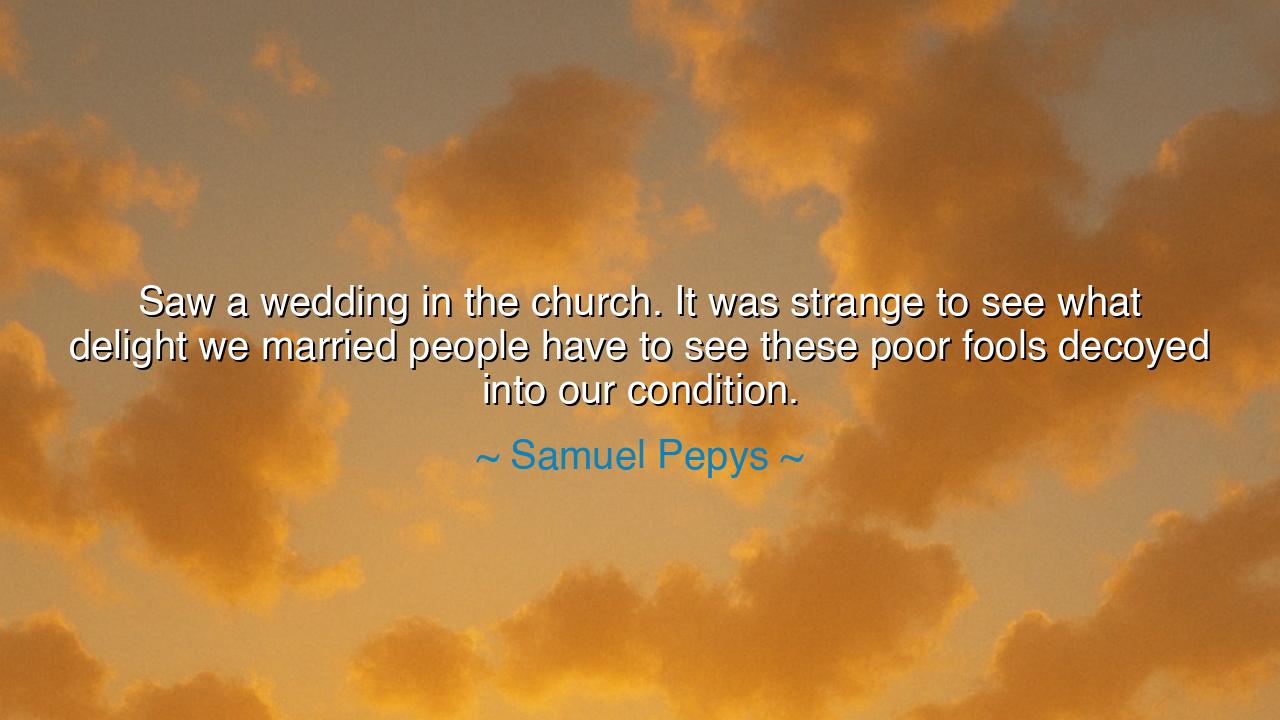
Saw a wedding in the church. It was strange to see what delight
Saw a wedding in the church. It was strange to see what delight we married people have to see these poor fools decoyed into our condition.






The words of Samuel Pepys—“Saw a wedding in the church. It was strange to see what delight we married people have to see these poor fools decoyed into our condition.”—are both humorous and bittersweet, written by a man whose diaries revealed the hidden truths of daily life in seventeenth-century England. With irony, Pepys observes that those already in the bonds of marriage take a peculiar delight in watching others enter it, as though amused by the innocence of those who do not yet know the trials that await. His words remind us that joy and cynicism often walk hand in hand when speaking of wedlock.
This utterance speaks of the duality of marriage. To those newly joined, the wedding appears as a promise of bliss, filled with laughter, vows, and radiant hope. Yet to those who have lived long within its covenant, marriage reveals itself as both burden and blessing, requiring endurance, compromise, and resilience. Pepys, with sharp wit, casts marriage as a condition into which the “poor fools” are “decoyed”—a trap disguised as treasure. His jest, however, conceals a deeper recognition of the weight that accompanies vows.
History offers us the tale of Henry VIII of England, whose six marriages stand as a testament to both the allure and peril of matrimony. Each union began with ceremony and promise, yet ended in tragedy, annulment, or blood. His story shows, as Pepys suggests, that the wedding day is but a doorway, and what lies beyond may be far more complex than the bliss imagined by those who enter it. The delight of onlookers often comes not from cruelty, but from the recognition that others, too, will learn the hard lessons of love and endurance.
The quote also reflects the humor of the human condition. In laughing at the newlywed, Pepys reveals how people often find solace in shared struggle. By calling marriage a “condition,” he likens it to an ailment one must learn to live with, finding relief in the fact that no one suffers alone. Such humor does not deny the joys of companionship, but acknowledges that even joy carries with it the trials of patience, jealousy, and human weakness.
Let this teaching endure: do not be deceived by the glitter of the wedding day, nor despair when the burdens of marriage arise. Both delight and difficulty are woven into the fabric of union. Pepys’ wit is a reminder that laughter, even at our own struggles, is a necessary balm. For though marriage may feel at times like a trap, it is also a forge, shaping souls through challenge as much as through love. And in that forge, both the “fools” and the wise are made equal.






NLNgan Luong
This statement feels so human—it’s funny, cynical, and strangely empathetic all at once. Pepys seems to be acknowledging that marriage is both a source of joy and frustration, and that watching others enter it brings a mix of nostalgia and relief. I can’t help but think: do we mock others’ idealism because we envy it, or because experience has made us wiser? Maybe a bit of both.
HVThi Thu Hoai Vo
I find this line fascinating because it shows how self-aware married people can be about their own discontent. Pepys’s tone feels half-joking, half-resigned—like someone both in love with and trapped by the institution. It makes me question whether his words reflect universal truths or just his personal weariness. Is marriage truly a ‘decoy,’ or is it simply a mirror that magnifies our flaws and expectations?
DHhoang duy hung
There’s a biting humor here that still feels relevant centuries later. Pepys captures that strange mix of affection and exasperation that long-term couples often have. It’s almost as if he’s saying, ‘Welcome to the club of beautiful chaos.’ But I can’t tell if he’s being bitter or just wryly amused by human nature. Maybe marriage is one of those experiences you can only laugh about once you’re in it.
BHNg Bich Hanh
This quote made me laugh, but it also stings with honesty. Samuel Pepys seems to be poking fun at the irony of marriage—the way married people warn others of its hardships while secretly finding joy in watching others make the same mistakes. It makes me wonder if marriage always feels like a shared joke between the disillusioned. Is it cynicism or just a deeper understanding of love’s compromises?